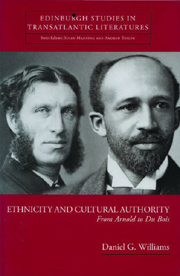4 - BLACK FOLK IN THE KINGDOM OF CULTURE
Published online by Cambridge University Press: 12 September 2012
Summary
Our greatest danger is that in the great leap from slavery to freedom we may overlook the fact that the masses of us are to live by the production of our hands, and to fail to keep in mind that we shall prosper in proportion as we learn to dignify and glorify common labor and put brains and skill into the common occupations of life; shall prosper in proportion as we learn to draw the line between the superficial and the substantial, the ornamental gewgaws of life and the useful. No race can prosper till it learns that there is as much dignity in tilling a field as in writing a poem.
Booker T. Washington, ‘The Atlanta Exposition Address’ (1895)The period from 1880 to 1915 has been described as ‘the age of Booker T. Washington’ by historians of black America. Born into slavery, Washington became a leading African-American spokesperson and educationalist renowned for advocating a shift in black thought from an emphasis on political enfranchisement to economic development, from social integration to agricultural self-sufficiency. In his September 1895 speech to the ‘Cotton States and International Exposition’ in Atlanta, Washington argued that, given that a third of the South's population was African American, any ‘enterprise seeking the material, civil and moral welfare’ of the region could not disregard their interests. He suggested that African Americans should shun the temptation to head north for employment – ‘Cast down your buckets where you are’ – and contribute to the capitalist economic expansion of the Southern States.
- Type
- Chapter
- Information
- Ethnicity and Cultural AuthorityFrom Arnold to Du Bois, pp. 176 - 223Publisher: Edinburgh University PressPrint publication year: 2005



